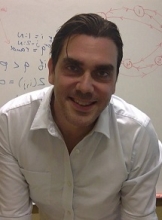BME Lecture Series: Gabriel A. Silva, UC San Diego

Professor
Department of Bioengineering
Department of Neuroscience
Abstract: The brain represents, learns and manipulates information very differently than existing artificial neural networks, machine learning and other forms of artificial intelligence. The brain learns by analogy and by abstracting beyond the information presented to it. Our algorithms and methods capture some of these unique neurobiological capabilities in order to engineer natural intelligence systems. In particular, our focus is on the development of systems and methods capable of achieving real-time, robust and adaptive situational and contextual learning, analytics, pattern recognition and computation at ultra-low power and with minimal training. Furthermore, the engineering we are doing has given us new tools and perspectives about how the brain functions as a system. Specifically, we are using the same theory and mathematics to map out actualized spatial temporal signaling patterns in the connectome of C. elegans, and to investigate how individual neurons optimize the ratio between network wiring paths, dictated by their morphology relative to the conduction velocities of action potentials. This ratio theoretically predicts optimized bounds for signaling (information flow) in geometric networks to which individual neurons seem to adhere.
Bio: Gabriel A. Silva is a professor and vice chair in the Department of Bioengineering and in neurosciences at the UC San Diego. He also is director of the Center for Engineered Natural Intelligence and co-director of the Retinal Engineering Center in the Institute of Engineering in Medicine and has additional appointments in the Department of NanoEngineering, the BioCircuits Institute, the Neurosciences Graduate Program, Computational Neurobiology Program, and Institute for Neural Computation. Silva has received numerous awards and recognitions for his research and teaching. He has published over 50 different peer reviewed papers, book chapters and books, over 100 abstracts and conference proceedings at national and international meetings, and has given over 120 lectures and invited talks with 10 being plenary keynote lectures or named lectures.
Share
Upcoming Events
-
MSE Special Seminar: Architecting 3D Complex Materials for Sustainability
-
MSE Special Seminar: Decarbonizing Industries for a Climate-resilient Future - From Renewable Energy to Sustainable Material Recovery
-
CEE Seminar: BIM and the Digital Twin
-
MSE Special Seminar: Revolutionizing Battery Technology - Engineering Quantum Materials for Enhanced Safety and Performance in Solid Electrolytes
-
MSE Special Seminar: Designing Sustainable Soft Matter from the Molecule Up
